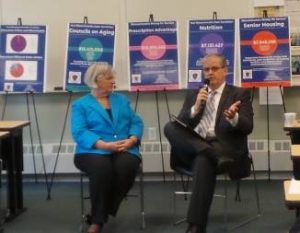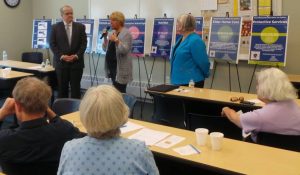Advocating for Seniors
 Since taking office, Rep. Stanley has worked side-by-side with members of the Executive Office of Elder Affairs as well as local Councils on Aging on issues important to seniors such as health care services and delivery systems, housing, long-term care, transportation, economic well-being, socialization, nutrition, family and community support and security.
Since taking office, Rep. Stanley has worked side-by-side with members of the Executive Office of Elder Affairs as well as local Councils on Aging on issues important to seniors such as health care services and delivery systems, housing, long-term care, transportation, economic well-being, socialization, nutrition, family and community support and security.
A senior in Massachusetts is defined as an individual who is 60 years old or older. In our Commonwealth today, there are currently 1.3 million individuals over the age of 60. In the next five years, the state’s overall population will increase by 4.3%. In the same five years, the group of individuals over 60 will increase by 20%. In 2020, people over the age of 60 will make up 24% of the Massachusetts population. Most stunningly, the University of Massachusetts Gerontology Institute informs us that by December 31st of this year there will be more people in Massachusetts over the age of 60 than people under the age of 18.
 It is one of the greatest tasks of our generation, and as an elected official, to adequately plan, prepare and provide initiatives and resources for the seniors of our society.
It is one of the greatest tasks of our generation, and as an elected official, to adequately plan, prepare and provide initiatives and resources for the seniors of our society.
Below are several budget items Rep. Stanley supported in the fiscal year 2017 state budget:
- The Councils on Aging represent one of the most significant increases within Fiscal Year 2017’s budget that will positively impact older adults and our cities and towns. The formula grant increased from $9 to $10 per senior, funding the Councils on Aging at $14,650,000. Councils on Aging conduct more than 100 programs including, information and referral, outreach, transportation, meals, health screening, health insurance information benefits counseling, fitness, recreation, computer access, education and life-long learning activities, as well as a myriad of other programs and services unique to each community. This increase will be reflected in the budgets of every city and town in our Commonwealth and is the result of the advocacy of nearly every Representative. Councils on Aging have the capacity to positively impact the lives of every senior, their loved ones, neighbors and communities in the Commonwealth.
- The Senior Nutrition Program is now funded at $7,256,375. This program provides seniors with congregate dining, meeting one-third of their nutritional needs for the day, as well as socialization. For seniors who are home and isolated, programs like “Meals on Wheels” may provide the only hot meal of the day and the person who delivers that meal may perhaps be the senior’s only human contact that day.
- Healthcare, including access, setting and quality of services and prescription costs are major influences on a senior’s quality of life. The Elder Home Care program, within three line items, provides care and services to seniors in their homes and community, allowing seniors to age in place. These services include homemaking, personal care, medical assistance and other individualized services through the Aging Services Access Points. The Elder Home Care program is now funded at $209,626,454.
- This year’s budget also provides $18,521,922 for the Prescription Advantage program. This drug insurance program allows many of the Commonwealth’s most vulnerable and frail seniors to receive their needed medications when overwhelmed by costs and the Medicare “donut hole”.
- The FY17 budget allocates $7,728,275, in two line items, for supportive senior housing and congregate senior housing. Current use of resources and community conversations will continue to focus our planning in this area.
- Protective services are now funded at $28,048,120. Elder abuse includes physical, emotional and sexual abuse, neglect by a caregiver, self-neglect and financial exploitation. The goal of protective services is to remedy or alleviate the abusive situation and to prevent the reoccurrence of abuse. This increase in funding allows for additional support in protecting older adults from these hardships.
 As state representative, Rep. Stanley has also helped pass bills that positively impact the lives of seniors:
As state representative, Rep. Stanley has also helped pass bills that positively impact the lives of seniors:
S 1882-An Act Relative to the Massachusetts Alzheimer’s and Related Dementias Acute Care Advisory Committee
This legislation will create an Alzheimer’s and Related Dementias Acute Care Advisory Committee to: Craft a strategy to address dementia-capable care in all acute care settings; Present this strategy to state legislature and relevant state agencies and departments; Assist in implementation of the strategy; Assess whether acute care settings are dementia-capable; Coordinate with the federal government to ensure access to dementia-capable care in acute care settings; and Provide information and coordination of Alzheimer’s and related dementia care in acute care settings across state agencies
S 2249-An Act Relative to Uniform Adult Guardianship and Protective Proceedings Jurisdiction
This legislation will create a clear process for determining which state has jurisdiction to appoint a guardian or conservator if there is a conflict. It outlines a procedure for transferring a guardianship or conservatorship to another state and for accepting a transfer, helping to eliminate some of the expense and wait for families. This legislation will help to facilitate enforcement of guardianship and protective orders from other states by authorizing registration in Massachusetts.
FY14 Budget
Councils on Aging—The formula grant was increased from $7 per elder per year to $8 per elder per year.
Home Care—Wait lists were eliminated thanks to additional funding secured for this program.
Notification of senior health care options— The FY14 budget directed MassHealth to provide each beneficiary age 65 and over with an annual notice of the options for enrolling in voluntary healthcare programs.
FY15 budget
Home Care—The legislature and the administration secured funding to ensure that there are no waiting lists for home care in FY15.
Councils on Aging— The legislature secured funding to bring back innovation grants for Councils on Aging which fund proposals for new programs at COAs including: job search services, benefits screening tools, transportation to regional Councils on Aging and enhanced benefits screening for elders.
Homemaker Salary Reserve—The legislature included funding that will provide an annualized wage increase of approximately 75 cents an hour to over 17,000 homemakers and personal care homemakers.
Elder Protective Services—The legislature appropriated $50,000 to establish a financial abuse specialist team that will assist elder protective service workers.
Nursing Homes—The legislature approved changing the base reimbursement year for nursing homes from 2005 to 2007. This will help ensure that nursing homes are reimbursed for an amount that more closely reflects their current costs of providing care.
Psychotropic Medications—The legislature established an outside section requiring the Department of Public Health to create a schedule of psychotropic medications that require informed written consent before they can be administered to patients in a nursing home, rest home, or other long term care facility.
Other 2013-2014 accomplishments
Elder Protective Services Commission—This commission has drafted recommendations to develop a multidisciplinary approach and standardized training and coordination procedures to enhance the effectiveness of the protective service program in reducing and addressing neglect, abuse and financial exploitation.
LGBT Aging Commission—This commission is in the process of collecting testimony in order to analyze the health, housing, financial, psychosocial and long-term care needs of older lesbian, gay, bisexual and transgender adults, and their caregivers, and to make recommendations to improve access to benefits and services where appropriate and necessary.
Elder Economic Security Commission—This commission has begun meeting to begin collecting information necessary to: assess older adults’ current level of economic security; identify policies and programs currently in place to assist older adults; assess the needs of state and local programming to increase elder economic security; and make recommendations to the legislature.
Rolling back fares for the RIDE—The MBTA increased fares for the RIDE (paratransit for seniors and people with disabilities) from $2 to $4 in July 2012. A study from the Executive Office of Elder Affairs and the Massachusetts Office on Disability determined that the increase in fares led to isolation and other negative outcomes, so the legislature worked with the MBTA and EOEA/MOD to roll back fares from $4 to $3 in December 2013.